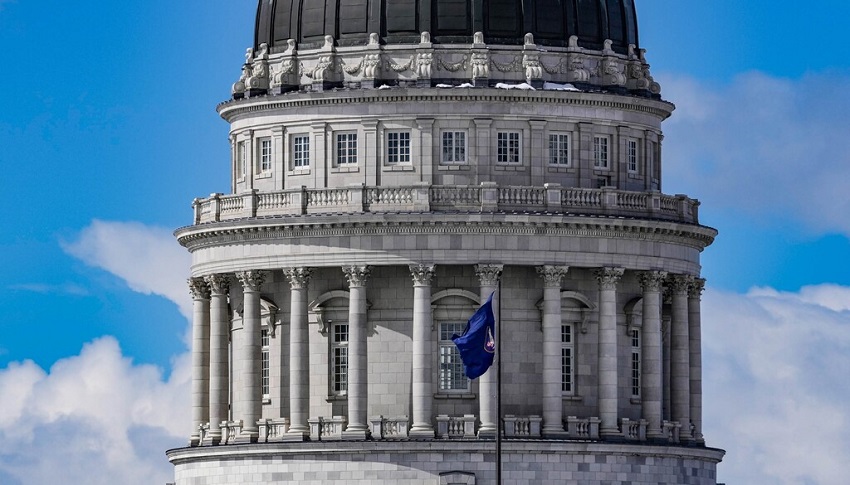SALT LAKE CITY, UT — Several proposals aimed at reforming Utah’s judicial branch are making their way through the state legislature, with key changes being discussed regarding the Utah Supreme Court, judicial retention processes, and the procedures surrounding constitutional challenges. These proposals come in the wake of a summer ruling that struck down Amendments A and D, which were seen as significant defeats for the legislature. In response, top legislative leaders, including House Speaker, have expressed the need for judicial reforms.
Senate leaders, however, assert that the proposals are not retaliatory in nature but are aimed at improving judicial efficiency and speeding up the decision-making process in the state’s courts. They point to unresolved cases, such as Utah’s abortion trigger ban, which have lingered in the judicial system for years without resolution.
“We’ve got three branches of government, two of which are directly elected by the populace, and the third one is kind of like in a little black box,” Senate Majority Leader Kirk Cullimore (R – Draper) said, explaining the rationale behind the proposals.
Though no bills have yet passed, several proposals are gaining traction within the legislative process, with opposition from groups like the Utah State Bar, which argues that some of the reforms could undermine the separation of powers and inject politics into the judiciary. Here is a breakdown of the key bills currently under consideration:
1. Expanding the Utah Supreme Court
One of the most significant proposals involves expanding the Utah Supreme Court. House Majority Leader Rep. Jefferson Moss (R – Saratoga Springs) has suggested adding justices to the court in response to growing caseloads, delays, and increasing legal complexities in recent years.
“The Legislature has the ability to adjust the court’s size in response to these growing demands,” Moss said, emphasizing the need for reform to keep pace with the state’s evolving legal landscape.
2. Appointing the Chief Justice of the Supreme Court
A new bill introduced by Senate Majority Whip Chris Wilson (R – Logan) proposes allowing the governor to appoint the Chief Justice of the Supreme Court, subject to confirmation by the state Senate. Under the current system, justices elect a Chief Justice by majority vote for a four-year term.
Wilson likened the proposal to the federal model, where the U.S. President appoints a Supreme Court Justice, followed by Senate confirmation hearings. He believes this will allow the public to have a more direct say in the judicial selection process.
“This is about aligning the selection process with that of the federal level, where the public can weigh in through confirmation hearings,” Wilson said.
3. Judicial Retention Recommendations from Lawmakers
Another proposal, House Bill 512, would create a “Joint Legislative Committee on Judicial Performance” to make recommendations on whether judges should be retained. These recommendations would then be placed on the ballot during retention elections.
While proponents argue that this will give voters more information about judges, critics, including the Utah State Bar, warn that it could politicize the judicial process and undermine the impartiality of judges.
“Judges will be made to answer to the legislature based on any disagreement with a judge’s ruling,” said the Utah State Bar in a statement, expressing concern that the process could inject politics into the otherwise merit-based evaluation system.
4. Raising Retention Election Thresholds
Another bill, House Bill 451, seeks to increase the threshold for judicial retention elections. Under current law, judges only need a simple majority of “yes” votes to be retained. However, this proposal would raise the requirement to 67% approval.
The bill, introduced by Rep. Jason Kyle (R-Huntsville), has not yet moved out of the rules committee but is generating considerable discussion. If passed, it would make it significantly harder for judges to be retained in office.
5. Prohibiting Injunctions During an Appeal
Senate Bill 204, sponsored by Sen. Brady Brammer (R – Pleasant Grove), would allow defendants to appeal an injunction when a trial court rules that a law must be paused due to potential unconstitutionality. The proposal aims to reduce what lawmakers see as the overuse of injunctions by lower courts that prevent newly passed laws from taking effect.
The Utah State Bar initially opposed the bill but later softened its stance and declared neutrality.
6. Limiting the Time for Constitutional Challenges
Senate Joint Resolution 009 would require parties seeking to challenge potentially unconstitutional laws to do so within 28 days from the time the legislature adjourns. Proponents argue this will speed up the resolution of constitutional challenges, but critics, including the Utah State Bar, believe the timeline could interfere with judicial fairness.
7. Limiting Third-Party Standing
Finally, Senate Bill 203 seeks to limit who can bring a case on behalf of others. This bill would impose stricter requirements for associations wishing to sue on behalf of their members. Proponents argue the bill is designed to prevent the courts from becoming a forum for out-of-state interests, while opponents worry it could make it harder for groups to challenge laws that harm their members.
The Utah State Bar has expressed strong opposition to the bill, arguing that it would undermine long-established common law principles regarding standing in court.
Conclusion
As these proposals make their way through the legislative process, they are likely to continue to spark intense debate. While some lawmakers argue the reforms are necessary to ensure a more efficient and accountable judiciary, critics warn that they could undermine the independence of the courts and inject politics into an otherwise impartial system. With the legislative session ongoing, the future of these proposals remains uncertain, and their potential impact on Utah’s judicial system will likely be closely watched.

